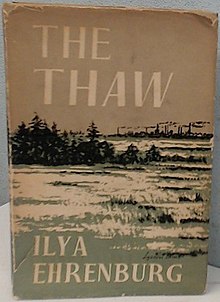
Cover art by Lynton Lamb
The Thaw (Russian: Оттепель, Ottepel) is a short novel by Ilya Ehrenburg first published in the spring 1954 issue of Novy Mir. It coined the name for the Khrushchev Thaw, the period of liberalization following the 1953 death of Stalin. The novel marked a break both from Ehrenburg's earlier purely pro-Soviet work, and from previous ideas about socialist realism.
Summary
The novel follows three main characters: Ivan Vasilievich Zhuravlev, a despotic factory manager, Vladimir Andreevich Pukhov, a painter working for the government, and Saburov, an unsuccessful colleague of Pukhov. Other characters include Vera Sherer, a Jewish doctor who is accused in the Doctors' plot.
Reception
The novel was very successful, selling all 45,000 copies of the first edition in a single day.
It drew criticism from the authorities for mentioning the Great Purge and other negative aspects of Stalinism; in late 1954 the Second Congress of Soviet Writers harshly criticized it, along with Vera Panova's novel The Seasons and Leonid Zorin's play Guests. Konstantin Simonov, then secretary of the Union of Writers of the USSR, accused Ehrenburg "of caricaturing ... artistic life." However, Ehrenburg was given a chance to defend himself in the Literaturnaya Gazeta.
It was translated into English by Manya Harari and published in 1955 by Regnery in the US and Harvill Press in the UK.
References
- ^ von Gelden, James. "1954: The Thaw". Seventeen Moments in Soviet History. Macalester College. Retrieved 1 December 2014.
- ^ Blois, Beverly (2005). "Thaw at Home remarks". Retrieved 1 December 2014.
- Abramson, Glenda (2004). "Ehrenburg, Ilya Grigorevich". Encyclopedia of Modern Jewish Culture. p. 228. ISBN 9781134428656.
- Sjeklocha, Paul; Mead, Igor (1967). Unofficial Art in the Soviet Union. University of California Press. pp. 67-68.
- Ehrenburg, Ilya (11 May 2019). "THE THAW". Amazon.co.uk. Regnery. Retrieved 11 May 2019.
External links
- Text in Russian
This article about a 1950s novel is a stub. You can help Misplaced Pages by expanding it. See guidelines for writing about novels. Further suggestions might be found on the article's talk page. |